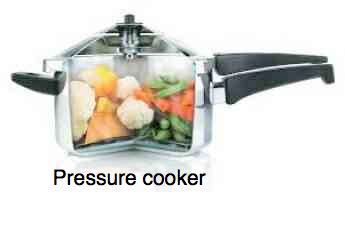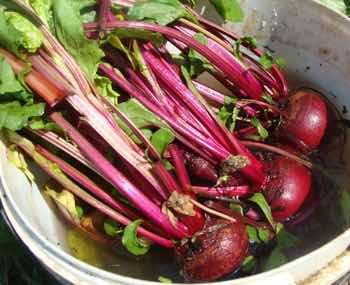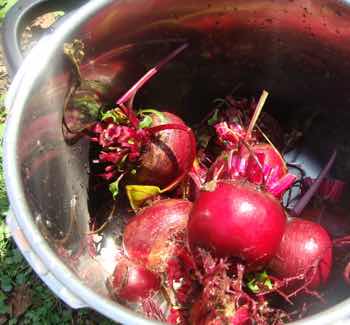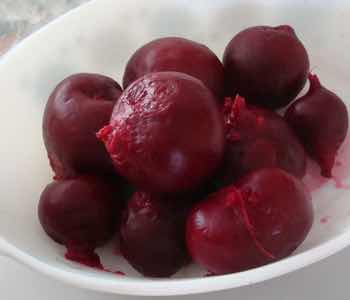- Bernard Preston homepage
- Purples
- How to Cook Beetroot
How to cook beetroot
How to cook beetroot is perhaps not quite so straight-forward; it takes over an hour of boiling unless you have one of these pressure appliances.
Beets are the vegetable that finally cured me of stubborn constipation so I have had a life-long admiration for them. Unless you too have suffered from that maliferous condition of the large bowel, you probably would not understand.
But do not give up on this page just because you have a happy tum. Beetroot has many other benefits, not least of which is a plentiful supply of iron; a blessing for every menstruating-woman.

This page was last updated by Bernard Preston on 8th February, 2024.
The beta-carotenes in beets alone make it worth the effort; and the great taste just adds further value.
They are a hardy vegetable and for that reason I advocate the pressure-cooker. It is a great saver of time; and electricity or gas. So that is money that can be better spent elsewhere. Look after the pennies and the pounds will care for themselves.
I am often surprised how few people have a pressure-cooker; whether you are a busy housewife looking to save time or a greenie hoping to protect the planet for your grandchildren, it is an important appliance for every kitchen. It uses a lot less energy.
We use ours several times every week, mostly for chickpeas, soups and even our famed butter-chicken.
How to cook beetroot

How to cook beetroot for this wonderful source of iron, soluble fibre and phytochemicals is what this page is about.

Pick your beetroot, cut off their tops and save the best. They make simply delicious greens; and are even tastier than spinach or Swiss-chard in my opinion.
The sugars in beets are quite quickly turned to starch. The sooner you get them from the garden and into the pot the better.
Depending on the size of your family, I like to cook eight-beets, unless I am going to pickle some. Otherwise they tend to go off in the fridge.
Nearly fill your pressure-cooker with the raw beets; add about an inch of boiling water, put on the lid to steam and turn up the heat. Make sure you have engaged the locking mechanism. A purple stain on your ceiling would make an interesting feature.
Once the air has escaped and it starts to steam, turn your pressure-cooker up to the highest setting; and the power to the lowest.
Turn the heat right down once you are up to pressure.
Depending on how large the beets are, give them about half an hour; a bit shorter if you like them firm. Then turn the heat off and wait about ten-minutes for the pressure to drop.
Open your pressure-cooker and, once the beets are cool enough to handle, squeeze off their skins.
Enjoy them with melted butter, making it a very wholesome dinner; or pickle some.

Growing beetroot
If you want really sweet vegetables, then you have to find a farmer so that you get them freshly-picked; or try growing beetroot yourself. They really are not difficult to rear and the leaves are delicious as a spinach; but they do need regular watering if it does not rain. Otherwise they go to seed before forming a bulb.
If you are on the verge of diabetes, then test your blood glucose but always in the context of a whole meal, which is otherwise low in starch; before your food and thereafter three times at half-hourly intervals.
They are first cousins to sugar-beets; both have masses of fibre.
They have a medium GI of 61 but a very low glycemic load; most of the starch ends up being fermented in the colon forming short-chain fatty acids, not glucose. Understanding net carbs is so important if you are concerned about your weight.
Whilst they do have considerable natural sugars they are also a rich source of a phytochemical called alpha-lipoic acid that helps lower blood glucose.
You will start reaping them in the autumn veggie garden right through winter and into spring.
Choice foods
If you suffer from constipation, anaemia and have a family history of polyps in the colon then this wonderful choice food should surely be regularly on the menu. How to cook beetroot however, to my mind is much simpler with pressure.
There is no point trying to rate them; is broccoli better than beetroot? Should you enjoy carrots rather than sweetcorn? Choose as many choice foods as you can if you want to get to your granddaughter's wedding and sit under the trees you once planted.
Forget not the tops. Provided they are fresh, young and not speckled with mold, then how to cook beet-greens[3] is a subject of equal importance.
It is the multitudes of colours in these so-called phytochemical foods that is behind the fact that they greatly reduce the incidence of all causes of death. Whilst a wellness neurosis is a serious psychological disease to be avoided at all cost, it behooves all those wishing to avoid chronic illness and premature death to take an interest in these yellow, purple and green veggies.
Chronic constipation
How to cook beetroot is a good way to start sorting out the chronic constipation that causes polyps, piles and colorectal tumours. The first sign is often a sudden blockage out of the blue. Prevention is better than a cure.
A rectal bleed of red blood is another sign; in 80 percent of cases it is diagnosed too late to treat successfully. The five years survival rate is not good.
Black blood is from the stomach, usually from taking anti-inflammatory drugs; an internal bleed from NSAIDs kills 14,000 Americans every year.
If you are feeling weak and trembly, have a routine full count. Occult-blood, unseen in the stool, causes anaemia; that is another sign of a colorectal tumour.
Researchers publishing in the journal Nature(1) report that constipation is one of the initiating factors of Parkinson's disease many years later. They state that it has been firmly established that friendly bacteria in the gut play a very important role in the immune-system. Have you heard of kefir benefits?
They keep the pathogens that form the nasty curli-proteins at bay simply because of their numbers; in particular E. Coli. Did you know there are nearly five pounds of friendly bugs in the blooming colon? But they are easily wiped out by antibiotics and the many chemicals we consume, especially artificial sweeteners. Avoid those soft-drinks if you want to live long in the land; just one a day increases the risk of Alzheimer's disease a massive three times.
Consumption of so-called resistant starch that is able to pass through the small intestine undigested, not only reduces the likelihood of insulin resistance but also inhibits the influence of pathogens such as E Coli; these nasties produce the amyloid curli protein that is involved in the neurodegenerative disorders such as Parkinson's disease.
The curli protein is highly transmissible, moving particularly to the olfactory nucleus in the brain, affecting the sense of smell[2]. The vagus nerve that controls the motility of the smooth muscles of the gut is influenced too; that means constipation.
Resistant starch passes through the small intestine undigested, reaching the colon where it is
fermented by the microbiota.
Read more about resistant starch and how you can through your food encourage the friendly microbiota to flourish in your gut. Especially take note of the importance of cooling and reheating of carbohydrate before consumption, a process known as retrogradation. Cook your beets today but enjoy them tomorrow.
Newsletter
Our newsletter is entitled "create a cyan zone" at your home, preserving both yourself and Mother Earth for future generations; and the family too, of course. We promise not to spam you with daily emails promoting various products. You may get an occasional nudge to buy one of my books.
Here are the back issues.
- Lifestyle and ideal body weight
- What are ultra-processed foods?
- Investing in long-term health
- Diseases from plastic exposure
- Intensive lifestyle management for obesity has limited value
- A world largely devoid of Parkinson's Disease
- The impact of friendly bacteria in the tum on the prevention of cancer
- There's a hole in the bucket
- Everyone is talking about weight loss drugs
- Pull the sweet tooth
- If you suffer from heartburn plant a susu
- Refined maize meal and stunting
- Should agriculture and industry get priority for water and electricity?
- Nature is calling
- Mill your own flour
- Bake your own sourdough bread
- Microplastics from our water
- Alternative types of water storage
- Wear your clothes out
- Comfort foods
- Create a bee-friendly environment
- Go to bed slightly hungry
- Keep bees
- Blue zone folk are religious
- Reduce plastic waste
- Family is important
- What can go in compost?
- Grow broad beans for longevity
- Harvest and store sunshine
- Blue zone exercise
- Harvest and store your rainwater
- Create a cyan zone at your home
Bernard Preston
If you found this how to cook beetroot page useful, then you will certainly enjoy one of Bernard Preston's books. On your Kindle, smartphone or tablet they are very cheap.
Have you read my latest trilogy? Only $1.14 each. Hold onto your hat. Find A Family Affair by Bernard Preston at Amazon.
Useful links
- Solar pressure cooking
- To prevent chronic inflammation in the body make sure you can answer the question, what is betaine?
- Bernie's beetroot soup
- Exposure to the Functional Bacterial Amyloid Protein Curli Enhances Alpha-Synuclein Aggregation in Aged Fischer 344 Rats and Caenorhabditis elegans.
- Anosmia and Ageusia in Parkinson's Disease
- How to cook beet greens. Web: https://tinyurl.com/mrxne6ej
- Artificial sweeteners and Alzheimer's disease
When browsing use right click and "Open Link in New Tab" or you may get a bad gateway signal.
Did you find this page interesting? How about forwarding it to a friendly book or food junkie? Better still, a social media tick would help.
- Bernard Preston homepage
- Purples
- How to Cook Beetroot
Address:
56 Groenekloof Rd,
Hilton, KZN
South Africa
Website:
https://www.bernard-preston.com